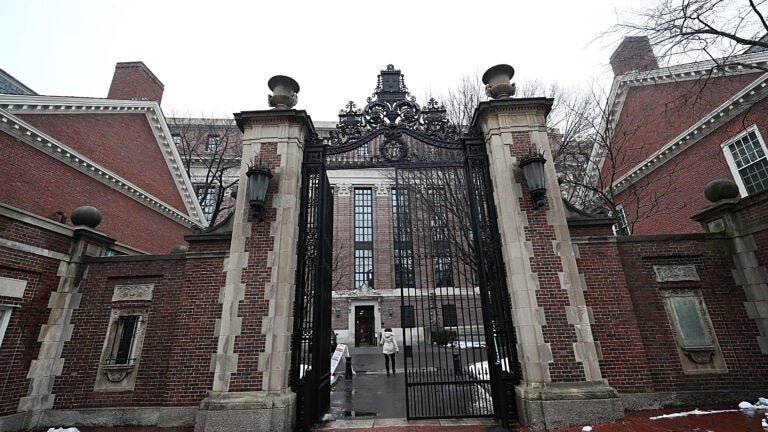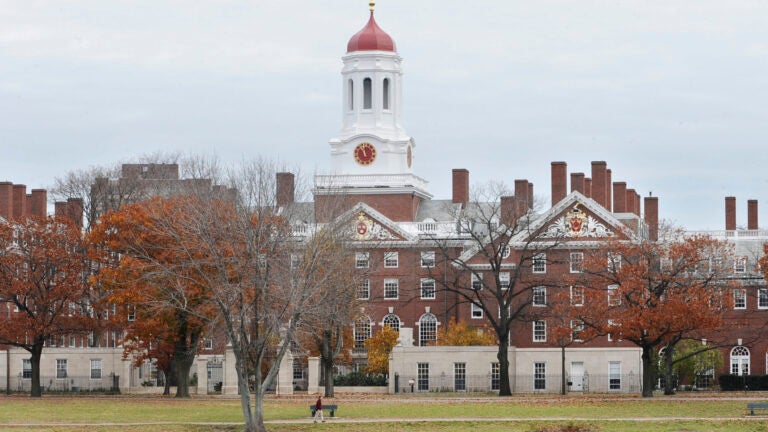Readers agree: Harvard is right to bring back standardized tests
“The ACT and SAT have deficiencies, but at least they are consistent.”
Last week, Harvard College announced it would bring back its standardized testing requirement for next year’s admissions cycle. The about-face of the university’s pandemic-era test optional policy comes as several elite universities across the country look for ways to diversify their student body in the wake of the Supreme Court’s landmark affirmative action decision last summer.
Harvard has joined MIT, Brown University, Caltech, Dartmouth, and Yale in requiring standardized test scores in the admissions process, after initially going test optional during the COVID-19 pandemic.
In a statement, Hopi Hoekstra, dean of the Faculty of Arts and Sciences at Harvard, said standardized tests help colleges find talent from across socioeconomic levels and provide valuable information about an applicant’s potential success in college.
Her sentiment is shared by Nat Smitobol, an admissions counselor with IvyWise, a for-profit college admission consulting firm for students applying to elite universities.
While some critics of standardized testing argue the tests benefit higher-income students who are more likely to be able to afford test prep classes and counselors, Smitobol said they might actually help diversify the applicant pool, which he said has become whiter and wealthier since going test optional during the pandemic.
“The applicant pool that test optional has created has not been optimal for what the colleges want and need, especially in light of the Supreme Court’s decision, where you can’t consider race in the affirmation process,” he said in an interview with Boston.com. Smitobol formerly served as an admissions director at Skidmore College and New York University’s Abu Dhabi campus.
Diversity is a priority for universities, Smitobol said, adding that students who didn’t submit their test scores under the test optional policy may have unintentionally withheld information that could have strengthened their application.
He gave the hypothetical example of a first-generation student with a 1420 score (“which is an incredible score,” he said) on the SAT who did not — but should have — submitted it to an elite university, such as Dartmouth, when given the option.
“That first-gen student would have been in the 99th percentile or above. But they’re like, well, Dartmouth’s average test score is between 1460 and 1550, so I’m not going to submit my test score,” he added. “But that kid would have probably been accepted.”
Including standardized testing in the college admission process can be a better way to predict a student’s success in college over looking only at grades, Smitobol said, which have been impacted by grade inflation that has ratcheted up since the pandemic.
The majority of Boston.com readers agree with Smitobol and Hoekstra, the Harvard dean, on the issue. Of the nearly 500 readers who responded to our poll, 60% said they agree with Harvard’s decision to reinstate standardized testing, with 38% in disagreement.
We heard from several Harvard alumni from across the opinion spectrum. Some who were in favor of bringing back the testing requirement said the tests are a way to consistently evaluate students and their academic potential.
Other alumni were against the University’s sudden about-face, like Megan P. from Andover, who questioned the quickness of the decision and the ramifications for marginalized students. She called the decision “untimely and unduly burdensome on young and aspiring university applicants,” and said she believes it would run “counter to Harvard’s stated strategic goal to attract and retain under-represented college-attending youth.”
Below, see what other readers had to say about Harvard reinstating its standardized testing requirement for fall 2025 applicants.
Responses have been lightly edited for grammar and clarity.
Harvard College has reinstated its standardized testing requirement for fall 2025 admission. Do you agree?
Yes, I agree
“As a Harvard grad myself, I strongly favor the reincorporation of SAT type of test scores into Harvard’s admissions process.” – Nicholas F. (BA ’66, MBA ’75)
“Test results are one piece of information to use in evaluating applicants. Their value is obvious. Harvard and other schools that are concerned about having a diverse student body, have admissions officers that are smart enough to use the data together with all the other factors that they consider when making decisions about acceptance.” – Davy R., Seattle, Washington (formerly of Wellesley)
“Removal of testing leads to arbitrary acceptance criteria.” – Marc T., Tewksbury
“Tests give a chance to prove talent. Otherwise admissions from less known schools are too risky.” – A.P., Newton
“There is no better predictor of how a college freshman will perform than the SAT or ACT. To leave either of those tools off the table turns ALL colleges into standardless systems. Using these tools allows the professors and students to concentrate on a more thorough analysis of content, while eschewing their use wastes valuable time by remediating students’ inability to read, write, and do the essential math it takes to analyze and synthesize data. It is amazing how administrators in higher education lost sight of this. Hopefully reinstating the use of standardized tests in the admissions process at one influential college will serve as a wake-up call for all.” – Ed T., Worcester
“It won’t impact students from across the socioeconomic background other than to allow the strongest students to rise to the top and be at Harvard. To believe that other factors should take priority (or to further the false idea that standardized testing is somehow discriminatory) is to continue to embrace the soft bigotry that certain students belong at our nation’s top schools, and others got in because of factors other than their skills or capabilities.” – Jim, Plymouth
“Grade inflation is out of control! Test scores help admissions officers see through artificially high grades. Just because scores are required doesn’t mean Harvard can’t evaluate them within the broader context of a student’s application (for example, recognizing that not all students have access to expensive test prep).” – Charley, Ayer
“There is substantial variation in high schools – public, private, urban, suburban, region, etc. There needs to be a way to objectively compare preparedness for college.” – Bob, Needham
“With grade inflation rampant across the country, the SAT gives a neutral and objective way to compare students from different cities and states.” – Carl S., Hanover
“As a teacher, I know that grades are a relatively poor indicator. My class can differ in rigor and scope from the teacher’s down the hall – nevermind that of a teacher in another district or state. With so many policies that lead to rampant grade inflation, admin putting the AP label on courses that are in no way aligned to the AP exam, grades are now as unreliable as they’ve ever been. Gone is the “gentleman’s C”; it is now the gentleman’s A-. The ACT and SAT have deficiencies, but at least they are consistent.” – Rita C., St. Louis, Missouri
No, I disagree
“Standardized tests are not only biased toward higher-income students who are more likely to be able to afford expensive test prep classes and have access to more educational opportunities; they are also not predictive of someone’s future success. Standardized tests only determine which students are good at taking tests. I believe the best course of action for universities like Harvard is to factor in somebody’s involvement with extra curricular activities in high school or volunteer activities in addition to the scores received from standardized testing. It should not be used as one measure fits all!” – Douglas P., Bedford
“I am a high school teacher and in my 25-years of experience, the standardized testing is unfair, especially for our English language learners.” – Tony, East Boston
“I attended Harvard University from September 2001 through June 2005. I disagree with Harvard University’s sudden about-face on the topic of standardized scores for the following reasons: It is politically motivated; It is untimely and unduly burdensome on young and aspiring university applicants; It is counter to Harvard’s stated strategic goal to attract and retain under-represented college-attending youth from every quarter of the globe; I believe that the sudden reversal is designed to attract yet more negative publicity to drown out the more important conversation about why and how Claudine Gay was bullied into resigning the Harvard University presidency.” – Megan P., Andover
“I put my child in an online SAT prep program, resulting in a 300 point improvement and a near perfect math score. So my child benefitted from a test prep that an equally qualified candidate might not have had access to. This made me realize that the SAT is biased toward the privileged. Colleges need to work harder and stop obsessing about quantitative metrics.” – Steve, Andover
“This is just a tool to gatekeep. It’s their school so it’s their prerogative, but call a spade a spade.” – Chris, Revere
Boston.com occasionally interacts with readers by conducting informal polls and surveys. These results should be read as an unscientific gauge of readers’ opinion.








Be civil. Be kind.
Read our full community guidelines.